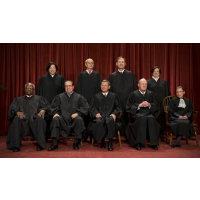For Supreme Court Justices, the Right to Free Speech Depends on the Speaker’s Politics

The right of free speech as guaranteed under the First Amendment is more often than not upheld by members of the U.S. Supreme Court based on their own liberal or conservative viewpoints.
A study by three political science professors found that many of the court’s current justices display “in-group” bias when it comes to free-speech rulings, meaning they’re more likely to side with those who share their beliefs.
Justice Antonin Scalia, the present court’s longest-serving member and one of its most conservative, also has the court’s most pronounced history of supporting speech by conservative speakers more often than he does that of liberal speakers, the study showed that his record on 161 cases from 1986 to 2011 revealed that he favored conservative speakers in 65% of the cases they brought before the Court, but voted in favor of liberal free speech in only 21% of their cases.
Justice Clarence Thomas, who joined the court in 1991 and rarely votes against Scalia, had a similarly large conservative-over-liberal gap, 65% to 23%, in deciding free speech cases.
The study’s authors (Lee Epstein of Washington University, Christopher Parker of Centenary College, and Jeffrey Segal of Stony Brook University) said Justice Anthony Kennedy favored conservative speakers by a smaller but still significant margin of almost 25%.
The court’s more liberal members “present a more complex story,” according to the study.
Justice John Paul Stevens, who retired in 2010, had nearly a 20% gap of favoring liberal views over conservative ones. But the differentials belonging to Justices Ruth Bader Ginsburg (more than 15%), David Souter (10%) and Stephen Breyer (less than 5%) were all more narrow while still favoring liberal speakers.
Chief Justice John Roberts Jr. and Justices Samuel Alito Jr., Sonia Sotomayor and Elena Kagan have not been on the court long enough to accurately gauge their histories, the researchers said.
The study reviewed 4,519 votes in 516 cases from 1953 to 2011.
The study’s findings come as a poll shows that most Americans believe that Supreme Court justices decide cases based on their personal ideology, rather than impartial legal analysis.
The poll from Democracy Corps showed that 60% of those surveyed believed that justices allow their personal or political views to influence their decisions.
-Noel Brinkerhoff
To Learn More:
For Justices, Free Speech Often Means ‘Speech I Agree With’ (by Adam Liptak, New York Times)
Have American Politics Killed the Impartial Supreme Court? (by Jaime Fuller, Washington Post)
Roberts Supreme Court Not a Friend of Free Speech (by Noel Brinkerhoff, AllGov)
- Top Stories
- Unusual News
- Where is the Money Going?
- Controversies
- U.S. and the World
- Appointments and Resignations
- Latest News
- Musk and Trump Fire Members of Congress
- Trump Calls for Violent Street Demonstrations Against Himself
- Trump Changes Name of Republican Party
- The 2024 Election By the Numbers
- Bashar al-Assad—The Fall of a Rabid AntiSemite






Comments